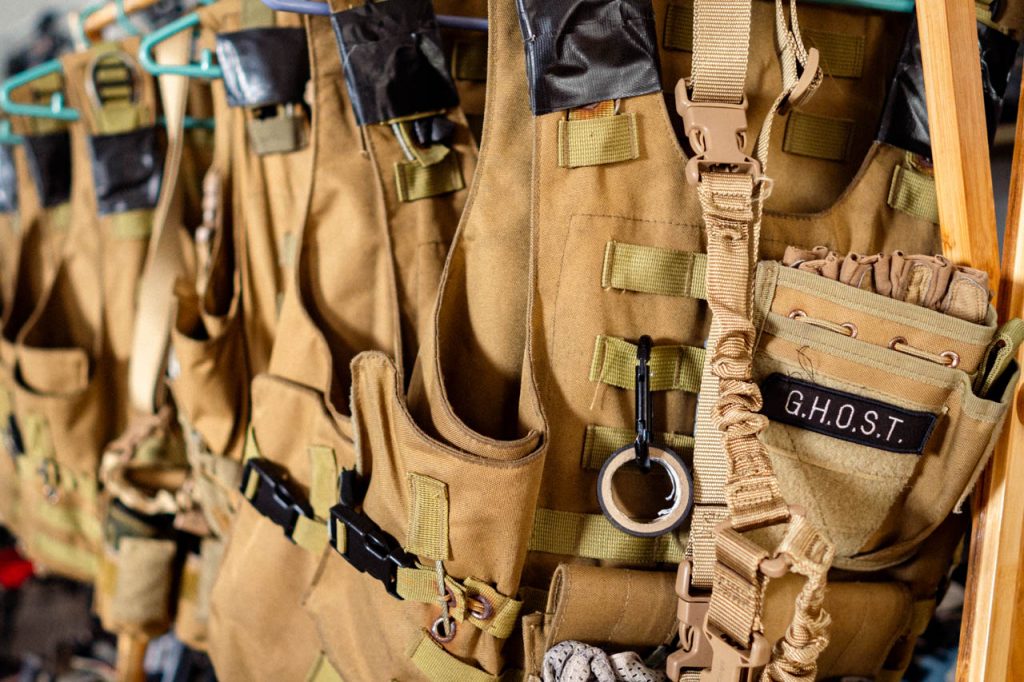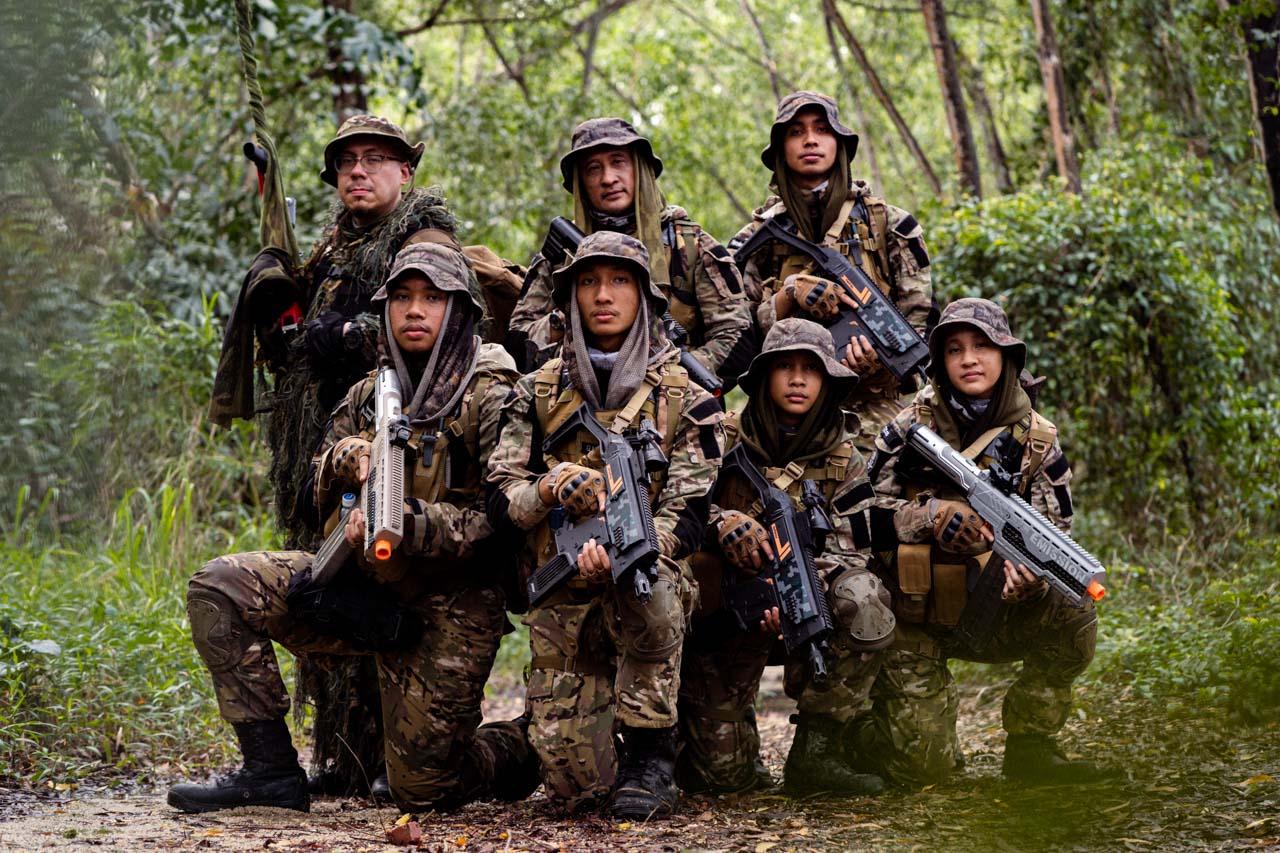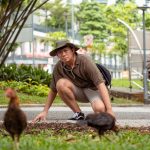All Images and Videos by Stephanie Lee for RICE Media
Along a quiet staircase of an HDB block in Pasir Ris, 19-year-old Abdullah Ahmad (code name: JagJag) crouches behind a pillar with a NERF blaster in hand. The objective—a makeshift target board—is not far ahead.
Abdullah is not alone. His father, 56-year-old Mohamad Munir (code name: Hosan), and his four siblings are with him. They move stealthily along the corridors of their flat, each with a toy foam dart blaster in hand.
ADVERTISEMENT
They call themselves G.H.O.S.T. It stands for ‘Guts and Honour to Overcome Situations Tactfully’.
This urban warfare roleplay is posted on TikTok, where I first chance upon them. A family decked in tactical gear moving stealthily along the corridor of an HDB block can be easily misunderstood. Another bunch of doomsday preppers readying themselves for an inevitable apocalypse comes to mind.
I wouldn’t blame them. With the doomsday clock recently set at 90 seconds to midnight (and The Last of Us’ first season behind us), a weekend spent preparing for a nuclear war with family seems productive.
For most Singaporeans, family bonding involves dinners or movie nights. For G.H.O.S.T, it’s either scaling the stairways of their HDB block or traversing the muddy slopes of Tampines Quarry—all while decked in fatigues.
There’s always a target. “Assaulting an objective,” they call it.
It’s all part of their weekly family bonding activity which started in 2021. These roleplaying operations form the spine of their formation training, as Abdullah puts it. And all of that training is part of their ‘Family Integrity Training’—putting the team through their paces by moving as one unit.
The get-up is so on point that they’ve had encounters with the police before. But ever since the family’s active social media presence, they’ve had lesser brushes with the authorities—even going so far as to put up a display for the People’s Association.
The family moves in concert with each other, similar to how soldiers move in the field. When asked whether neighbours are intimidated, Abdullah chuckles.
ADVERTISEMENT
“Our neighbours are quite used to it. They know us. They understand that we’re not copying the military.”
“All the movement you see us do is something we’ve figured out when we plan for the gameplay. It’s a family bonding activity.”
Clearly, this is not your conventional family outing. Whether it’s crouching behind the pillars of their HDB flat or running through Tampines Quarry’s thick vegetation, why a family would subject themselves to a form of cardio dialled up to 11 on a weekly basis was beyond me.
So I tagged along to figure it out for myself.
The G.H.O.S.T Team
It’s a cloudy Sunday afternoon. This week’s formation training takes place in the jungle trails of Tampines Quarry. The muddy slopes around this abandoned sand quarry are especially slippery after some rain.
“We don’t have a wet weather plan,” Munir apologises. “But we’re prepared for any conditions.” Military-grade boots, a slash-proof uniform, and durable gloves form their outfits of the day.
My colleague and I stand out amongst the assembly of tactical gear. We were only appropriately dressed for a stroll through a park; not Tampines Quarry’s harsh terrain. The quarry is an expanse of steep muddy slopes, rough gravel trails, and thick undergrowth—I only had on a pair of sneakers, slightly oversized jeans, and a casual Uniqlo shirt.
We speak to Abdullah in hushed tones; loud noises will alert their ‘enemy’ to our presence. “Learning manoeuvres is fun. But it’s about the process. When you move through this [difficult] terrain, you get a boost of self-confidence. Sometimes, all we need is confidence. That’s the most important takeaway.”
I stumble on the uneven ground. Seemingly solid land collapses into a pool of mud if you’re not careful. The terrain is perfect, however, for mountain bikers, the occasional scrambler motorbikes, and Abdullah’s family.
True to the military-like gameplay, members each have their own code name and role to play in the team—from safety to operations. It’s Call of Duty come to life. Surprisingly, this harsh hobby has innocent beginnings.
“It all started when we walked along nature parks like Coney Island and Macritchie Reservoir. My dad complained we looked like we were walking along Orchard Road while on a trek. We were all over the place so my dad assigned us roles like watching out for each other.”
“Soon we were walking with purpose. We built up from there. Our treks got more and more dangerous. We eventually ended up at Tampines Quarry. For safety, we invested in equipment. Our uniforms are slash-proof so we won’t get cuts from thick vegetation.”

Those family hikes together have now grown into a full-fledged investment. Abdullah estimates that his family has spent somewhere between $2,000 to $3,000 over two to three years on equipment—blasters (the technical term for NERF blasters), boots, uniforms, and accessories.
But it’s worth the price. These sessions have become a weekly affair. Abdullah’s evenings are booked from Thursday to Sunday.
His family comes first. He’s never missed a gameplay session, even when he’s exhausted after 24-hour shifts at Tampines Fire Station, where he’s serving his National Service stint as a section commander.
“Yes, I’m tired. But seeing the excitement from my siblings keeps me going. It’s something we look forward to every week,” Abdullah intones. It’s the last we hear from him for a while.
Assaulting the Objective
We stop at a safe distance from the edge of an uphill slope, which Abdullah navigates with nonchalant ease. The rise and fall of the tricky terrain are now second nature. The next time we see him, he’ll be part of a team conducting an assault operation.
A distinct pop from a blaster signals the start of the uphill assault. Shouts shatter the silence of Tampines Quarry as the G.H.O.S.T team scales the slope. An ‘enemy’, played by a real-life family friend, is positioned in a patch of thick grass opposite the slope and ‘fires’ at them.
Nothing leaves the blasters except sound. The blasters have no foam darts. They only come into play during urban operations (i.e. HDB block sessions) when they shoot actual target boards.
The team reaches the top of the slope before crossing over a gravel path and forming a line at the edge of the thick grass patch. The ‘enemy’ is surrounded. Another distinct pop signals the end of the uphill assault.
Prior to each session, the operations are meticulously planned from the comfort of the family’s dining room. Munir, Abdullah’s father, leads the planning. His dining table doubles up as a base to conduct meetings and safety briefings.
As a former Company Sergeant Major in the Singapore Armed Forces, Munir naturally takes the role of Team Leader. Nuggets of wisdom—from how to communicate with one another during a crisis to developing tenacity in tough situations—are peppered throughout his brief. They’re all part of his training sessions.
The children watch intently as Munir speaks. He commands an air of respect when he goes through the plans. No one dares speak.
In my limited military experience, a plan requires several overlays of terrain for safety purposes. Munir only needs a classic stickman diagram to communicate—his children already know the terrain like the back of their hands.
His children are well-prepared. They have a backup plan if they ever get lost. “There’s an app called What3Words to convey your exact location and coordinates. My family can always locate me if I get lost,” 13-year-old Luqman (codename: Shadow) explains.
There’s a maturity beyond his years. When I was 13, I struggled with public transport maps, let alone figuring out how to navigate a jungle.
Such meticulous planning is nothing new for Munir. Several military accolades deck the display cabinets of his living room. His 20 years of military service come in handy when looking out for his children’s safety.
“We don’t use military tactics during our gameplay. It’s something we do for family bonding,” Munir clarifies when I ask if this activity is nothing more than reliving his glory days in the army.
“I do this because I want to protect my family and bring out family values,” he recounts with a steely gaze that brought me right back to when I was a measly recruit.
He points us in the direction of the next checkpoint. My colleague and I will station ourselves there, unless we want to be caught in the ‘crossfire’.
“We’re a big family. Seven kids. But none of my kids fight [with each other]. We’re united. It’s about honouring yourself and your family.”
Not Your Ordinary Family
A few more rounds of gameplay ensue. Each time, the ‘enemy’ strategically takes up a post in a concealed position before being captured by the team.
We’re brought to yet another thick grass patch for a break, much deeper within Tampines Quarry. We can no longer hear the sound of vehicles along Tampines Industrial Avenue 1. Take a wrong step and you might find yourself swarmed by angry red ants.
Despite the harsh terrain, the G.H.O.S.T team appear to be at ease in Tampines Quarry. They take their seats amongst the undergrowth with nary a concern.
This is not your standard family—in more ways than one. Abdullah recalls with pinpoint precision a core memory from his primary school days. A teacher reprimanded him for taking liberties during a class exercise: Drawing your own family tree.
“I have two mothers,” he casually remarks. “My teacher thought I was joking when I drew a family tree with one father and two mothers.”
The teacher doled a classic primary school punishment: He was made to stand up for the next 10 minutes.
When he graduated from secondary school, his classmates asked why two women were there to support him. Abdullah courteously explained that his father is in a polygynous marriage. The two women, Hayati and Bedah, are his mothers.
His classmates apologised after hearing about his family. While his unorthodox family structure draws concern among people, Abdullah considers it a blessing. It redefined what ‘family’ means to him.
“I was confused by their apologies. Having two mothers is the best thing that’s ever happened in my life. What do you mean ‘sorry’?” Abdullah offers when asked about how he deals with negative comments about his family.
It’s also twice the support for their formation training. When we first enter their house, the two mothers are in the midst of preparing lunch for their children—crab curry and mee goreng.
They’ll need all the fuel they can get for another afternoon at Tampines Quarry. It takes a village to raise a child, let alone seven children, five of whom are making weekly trips to rugged terrain.
“I feel very proud of them. It’s an activity,” 54-year-old Bedah shares when I ask her about the unorthodox family bonding. “Better than staying on their laptops all day.”
55-year-old Hayati agrees. “Sometimes, I see that it’s very tiring. But it’s good. It toughens them. It also prepares them for National Service. We support them by cooking for them and helping to take care of their equipment.”
It’s clear that both mothers love all the children equally, whether it’s their biological child or not. They refer to them as a group—it’s always “our children” instead of “mine”. Their responsibilities are split equally. When one mother is out of the house or at work, the other covers for her.
“My mothers both live in the same house. They love me equally; I love both of them equally. It’s a good thing. When one mum isn’t home, I can disturb the other one. Two sources of advice and motherly love,” Abdullah says with a smile.
Hosan, The Team Leader
Before departing for Tampines Quarry, Munir takes centre stage and oversees the entire preparation process. The G.H.O.S.T team is a well-oiled machine. The team, with their well-defined roles, are responsible for packing equipment, checking the weather, and keeping track of the different terrain. Within minutes, they’re ready to leave for Tampines Quarry.
The space outside Munir’s flat is now transformed into a proud display of his family bonding activity. Edgy skull masks stare back at you the moment you step out of the lift. An array of blasters greet you like the weapons selection screen of a first-person shooter.
It takes me a while to get used to seeing such a manicured display outside a HDB flat—these aren’t your typical potted plants or shoe racks after all. Everything is positioned just so as if an MP had just conducted a stand-by flat.
Munir’s stoic gaze breaks into a jovial smile when asked whether people have complained about the makeshift museum exhibition outside his flat. The father jokes that it helps food delivery riders identify their house much faster.
When asked about his family, he adopts a more sombre and reflective mood. “I am aware that I cannot stop people from putting forth their opinions [about my family]. I am not affected at all and understand why they behave this way,” he ponders. It’s something that he’s explored before in a TV interview on Suria.
Islam allows (but does not encourage) polygyny—a man can have more than one wife at the same time. In Singapore, Muslim men may marry up to four wives at a time, as long as he’s capable of providing for their financial, physical and emotional well-being.
There needs to be specific reasons for taking on another wife, which the Registry of Muslim Marriages rigorously reviews before approving. Even so, the first wife may voice her objection to the decision and appeal against it. A divorce can be filed by the first wife if the matter isn’t resolved.
These marriages are rare, and even the local Muslim community has conflicting sentiments about polygamy. According to Singapore’s Fifth CEDAW Periodic Report, polygamous marriages constitute 0.3 percent of Muslim marriages registered from 2009 to 2014. It’s not surprising, then, that the wider public might hold misinformed ideas about such families.
His children are fully aware of what others might say about their unconventional family structure too. It’s an experience ingrained in them since they were children. There was a time when their father was a martial arts teacher—students would criticise their family and dissuade others from joining.
“A lot of us figured it’s probably because he has so many children and two wives. Of course, it is upsetting to us all, but we all felt that perhaps it’s best that these people naturally filtered themselves away from us.”
“There are a lot more negative comments but that would be too long of an article,” Abdullah remarks. He avoids adopting an uncaring approach towards negative comments about his family.
Instead, he takes them in his stride—there’s a stronger imperative to keep his siblings closer. After all, they’re the only people in the world that can fully empathise with him.
And it’s partially why the G.H.O.S.T team return to the jungles of Tampines Quarry or the stairways of their HDB flat week in and week out. To keep each other close and united.
A long string of farewells ensued before we left for Tampines Quarry. I watch as each one of the children salam both their mothers before we left.
Continuing the Tradition
Abdullah’s siblings agree with their mothers. Out of the five members of the G.H.O.S.T team, four are the biological children of one mother and one is from the other—16-year-old Siti Hadijah (code name: Titos).
Even in the humid heart of the jungle, there’s a homely intimacy among the children. The terribly misquoted, “the blood of the covenant is thicker than the water of the womb”, actually means that the friends you choose are stronger than the people you share parents with.
But amidst the humidity and red ants, the saying collapses entirely—they’re both best friends and siblings.
“I haven’t heard anything negative from my friends. We’re just another family. And if I hear any negative comments, I’ll defend my family,” she declares. The siblings nod in agreement again before packing up for the home stretch of today’s gameplay session.
This time, they’ll move in a straight line. The frontman scours the jungle for enemies while the back of the line provides cover for the group. It’s a gruelling process. And it continues all the way to the end of the trail.
My colleague and I will have to catch up. To me, all the trees looked the same. To the G.H.O.S.T team, every passing tree is a step closer to the finish line, the location of the team’s first uphill assault.
A long gravel path tapers into a tight turn. We reach the drop-off of yet another steep slope. 16-year-old Mohamad Afnan (code name: Big Foot) points to an open patch of grass. It’s the same patch the ‘enemy’ hid in on the first uphill assault. The gameplay comes to an end.
As inappropriately dressed city-dwellers, we’re escorted down the slope by the team like precious cargo. 21-year-old Mohamad Wira (code name: Yamies), the oldest of the group, keeps a watchful eye on us.
“My dad is 56 this year. He doesn’t know how long he can do this. But as deputy team leader, I hope to continue this as long as possible. It’s a tradition. Maybe when we have our own families we’ll have more people to play with,” Wira explains.
A Family That Plays Together Stays Together
We reach the exit point unscathed. The only casualties are the pairs of shoes my colleague and I decided to wear that day.
The team assembles by the roadside. Blasters are carefully loaded into the family car. Isotonic drinks are passed around. They’re heading home for a shower and a quick debrief session. Next Thursday, they’ll do this all over again.
The team might be quick to caution against comparing themselves to the military, but there’s undoubtedly a sense of military-like camaraderie among the family.
“My dad saw from all the military training that they were really close. And he wanted that for us,” Abdullah explains. For now, he has his sights set on becoming a math and physics teacher after National Service.
Prepping for the collapse of civilisation is beside the point for the family’s military-like training. At its heart, the G.H.O.S.T team’s formation training unites them against external threats masked as malicious comments and inquisitive, disdainful stares at their family. Defence against people who can attack them is a bonus.
An unconventional family structure calls for unorthodox family-bonding activities. And from trawling through thick vegetation in merciless humidity and unending heat, lies an uncommon bond among this G.H.O.S.T team. It’s a family whose warmth and care you’d want to be a part of.
After all, a family that plays together stays together.







